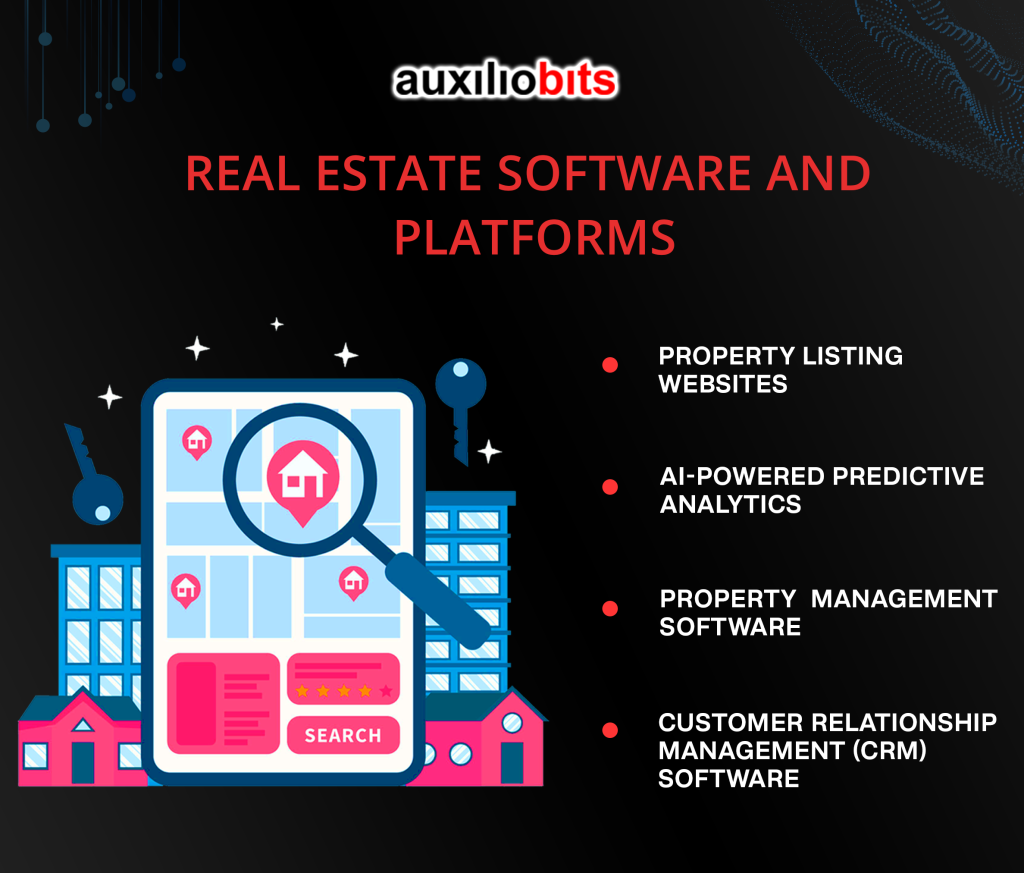
Key takeways
- Real estate is in the path of a digital revolution, where buying, selling & experiencing a home are as simple as a click, a tap, or even a question.
- Traditional real estate practices had several lacunas that made processes slow and complicated.
- Digital transformation in the real estate sector entails adopting innovative tools, software & methodologies to revolutionize how real estate professionals operate, from property listings to transactions.
- Technological investment has increased in the sector because it provides a competitive edge by boosting efficiency and transparency.
- Technology made inroads in the real estate sector as early as the 1990s and various technologies like blockchain, AI, VR/AR, and IoT, etc., are disrupting the traditional real-estate processes.
- Digital technology has streamlined processes, enhanced transparency, boosted efficiency, and expanded market research.
- In 2023 the demand for real estate has been increasing at a steady pace. However, the supply is unable to meet the rising demands leading to a surge in prices.
- Various tech tools like property listing websites, property management software, etc. are being deployed by real estate professionals to streamline processes.
Have you ever imagined buying a house without leaving your couch?
To buy a property without sifting through piles of paperwork?
Real estate is in the path of a digital revolution, where buying, selling & experiencing a home are as simple as a click, a tap, or even a question. But, how did we get here, from traditional practices to a tech-savvy world that’s rewriting the rules? Stop wondering! Here, we’ll go through the journey of the real estate sector’s transformation – how innovation, technology, and data are turning the dream of owning the perfect home into a modern-day reality. So, let’s get started!
In understanding the extraordinary journey of digital transformation in the real estate sector, it’s very important to take a step back and explore the historical practices that laid the foundation for today’s tech-savvy landscape.
- Traditional Real Estate Practices
- Challenges Faced By The Traditional Real Estate Industry
- Digital Transformation In Real Estate
- Growing Importance Of Technology In The Real Estate Sector
- Digital Revolution in Real Estate
- Impact Of Technology Adoption On Real Estate Business
- Current State of the Real Estate Market
- Trends In Property Sales And Pricing
- Tech Tools In Real Estate – Real Estate Software and Platforms
- Benefits Of Tech Tools For Agents And Clients
- Conclusion
Traditional Real Estate Practices
- Printed Listings and Binders
In the not-so-distant past, property listings were published in printed directories and often maintained in large binders, which real estate agents would carry around. These bulky binders were the go-to resource for property information.
- Personal Connections
Real estate transactions were highly reliant on personal connections. In the pre-digital era, 70 to 76% of transactions resulted from personal relationships and referrals. [Source : Liberty University]
- Paper-Intensive Transactions
Property transactions involve an extensive paper trail. It’s estimated that each transaction could generate up to 100 pages of paperwork. [Source : Adobe]
Traditional real estate practices had several lacunae that made processes slow and complicated.
Challenges Faced By The Traditional Real Estate Industry
- Slow Processes
Traditional real estate transactions were often characterized by a slow-moving bureaucracy. The average closing time for real estate transactions in the pre-digital era was around 47 days. [Source: Value Penguin]
- Lack of Transparency
Transparency in property transactions was frequently an issue. Buyers & sellers had limited access to information which made it difficult to make well-informed decisions.
- Inefficiency in Property Search
Property searches were inefficient, requiring prospective buyers to visit multiple locations physically. This not only consumed time but also limited options.
- Limited Market Exposure
Traditional practices limit the exposure of properties to a local or regional audience. This confined market exposure could lead to prolonged listing periods.
- Resistance to Change
Resistance to adopting modern technology was prevalent. Traditionalists within the industry were often hesitant to embrace change and new digital tools.
Digital Transformation In Real Estate
Digital transformation in the real estate sector refers to the extensive integration and utilization of modern technology to enhance and streamline the processes within the industry. It involves adopting innovative tools, software & methodologies to revolutionize how real estate professionals operate, from property listings to transactions.
Growing Importance Of Technology In The Real Estate Sector
Technological Investment Surge
In 2023, the real estate sector witnessed a substantial surge in technological investments. The global Real Estate market accounted for USD 5.15 trillion. This market is estimated to reach USD 8.52 trillion in 2032 the highest CAGR of 5.3% between 2023 and 2032. The huge technological investment in the real estate sector increases the significance of technology within the industry. [Source: Aboli More ; Market.us]
Digital Home Searches
86% of members have their own listings on their website, 70% have information about buying and selling, and 66% have a link to their firm’s website. [Source: NAR]
Several property buyers now use online platforms as their primary tool for home searches. This shift highlights the growing importance of digital channels for property transactions, signaling a fundamental change in how properties are bought and sold.
Enhancing Efficiency and Transparency
Technology adoption in real estate is not just about convenience, it’s also about efficiency and transparency. Property transactions, once burdened with complexities and paperwork, are now streamlined and transparent, offering a seamless experience for buyers and sellers.
Competitive Advantage
In an increasingly competitive real estate market, embracing technology provides a competitive edge. Those who leverage the latest innovations are better positioned to meet client expectations and succeed in an ever-changing industry.
Digital Evolution in the Real Estate Sector
To truly appreciate the impact of this digital evolution, it’s essential to take a look at the timeline of the real estate industry’s transformation.
- Early Digitalization (1990s)
The adoption of computers and early digital databases started the journey towards a more tech-oriented real estate industry. This period saw a shift from paper-based listings to digital databases.
- Rise of Online Listings (2000s)
The emergence of online real estate portals like Zillow, Realtor.com, and Redfin transformed the way properties were marketed and searched. This marked a pivotal shift towards online property listings and searches.
- Mobile Revolution (2010s)
The widespread use of smartphones revolutionized property searches and communications. Real estate apps and mobile websites made it possible for buyers to explore listings on the go.
- Blockchain and Smart Contracts (2010s)
Blockchain technology entered the real estate sector, promising secure and transparent property transactions. It reduced transaction times from an average of 45 days to just 30 days. [Source: Rocket Mortgage]
- Virtual Reality and Augmented Reality (2010s)
Virtual and augmented reality brought a new dimension to property viewing. Buyers could take virtual tours and visualize their future homes in unprecedented ways.
- Artificial Intelligence (AI) and Machine Learning (2020s)
AI-powered tools like chatbots and predictive analytics started to enhance customer service and streamline decision-making processes.
- IoT and Smart Homes (2010s)
The Internet of Things (IoT) led to the rise of smart homes. Properties became connected, offering energy efficiency, security, and convenience.
Impact Of Technology Adoption On Real Estate Business
The adoption of technology in the real estate sector has redefined how the business operates and serves its customers.
Streamlined Transactions
The average closing time for real estate transactions has significantly decreased from around 45-50 days to as little as 30 days. Digital tools and platforms have actually streamlined the entire process. [Source: Rocket Mortgage]
Enhanced Transparency
Blockchain technology has brought a new level of transparency to property transactions. With all transaction data securely stored on a blockchain, it’s accessible to all involved parties which reduces the risk of fraud & disputes.
Improved Efficiency
With the introduction of digital signatures & smart contracts, property transactions are more efficient than ever. They not only reduce paperwork but also eliminate the need for middlemen which saves time and money for both buyers & sellers.
Expanded Market Reach
The digital era has expanded the market reach of properties. Online listings and virtual tours make it possible for properties to attract interest from across the country or even internationally, increasing the potential buyer pool.
Current State of the Real Estate Market
Market Resilience
The real estate market has proven to be incredibly tough & strong. Despite economic challenges, the demand for properties remains strong. As of 2023, the market continues to attract both domestic and international investors.
Low Inventory
One of the defining characteristics of the current market is low inventory. Housing supply has not kept pace with demand that led to fierce competition among buyers & rising property prices.
Rising Prices
Property prices have been steadily increasing. The median home price has risen to approximately $350,000 which reflects a 10% increase over the last year. [Source: Attom]
Trends In Property Sales And Pricing
Online Listings and Virtual Tours
The adoption of online listings and virtual property tours has become more than a trend, it’s a necessity. Approximately 50% of homebuyers rely on virtual tours to explore properties before visiting them in person. [Source: Garell Group]
Competitive Bidding
Low inventory and high demand have given rise to competitive bidding, with many properties receiving multiple offers. This competitive environment has pushed property prices higher in certain markets.
Pricing Accuracy
Technology, including AI-driven pricing models, has made property pricing more accurate. Sellers can now set competitive prices that attract buyers, and buyers can make more informed decisions.
Real Estate Software and Platforms
Property Listing Websites
Platforms like Zillow, Realtor.com, and Redfin have become essential for listing properties. As of 2023, Zillow, for instance, boasts over 220 million monthly users. [Source: Business Of Apps]

Customer Relationship Management (CRM) Software
CRM software streamlines agent-client interactions, ensuring timely responses and personalized service. According to Grandview Research, 91% of companies with 10 or more workers now monitor and enhance the customer experience using CRM systems. [Source: LLC Buddy]
Property Management Software
Property management platforms offer comprehensive solutions for landlords and property managers. “The property management software market size was $1.73 Bn in 2022 and is forecast to reach $2.71 Billion by 2030, representing a CAGR of 5.73% throughout the estimated period.” [Source: Strategic Market Research]
AI-Powered Predictive Analytics
Predictive analytics tools utilize AI to forecast market trends, helping agents make informed decisions. By 2025, 78% of real estate firms have adopted AI-powered predictive analytics. [Source: Asper Brothers]
Benefits Of Tech Tools For Agents And Clients
Enhanced Customer Experience
CRM software and digital marketing tools have made it easier for agents to provide personalized service. As per the research, 87% of clients reported a more satisfactory experience with real estate agents using digital tools. [Source: Properties Online]
Property Insights
Property listing websites offer comprehensive information, allowing clients to make informed decisions. As per the research, around 91% of firms list their properties online. [Source: NAR]
Remote Collaboration
Tech tools facilitate remote collaboration and virtual transactions, a trend accelerated by the COVID-19 pandemic. By the end of 2020, 45% of real estate agencies had already implemented virtual reality tech. Digital transactions increased by over 25% in real estate during the COVID-19 pandemic.
Conclusion
In this ever-evolving landscape of real estate, have you ever thought about how far technology can take us? The journey from traditional practices to tech-savvy real estate has been absolutely revolutionary. It has brought us immersive property tours, data-driven decision-making, and the assurance of secure transactions through blockchain. But it doesn’t end here, it’s actually an ongoing saga of innovation & transformation.
Connect with the experts at Auxiliobits to help you identify the best automation and deploy them for your real estate business!






